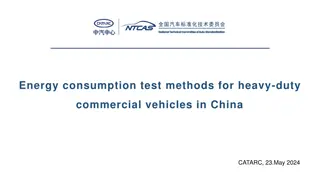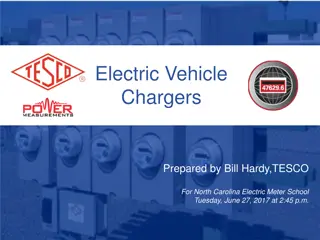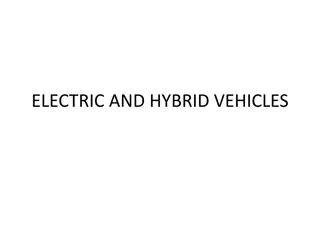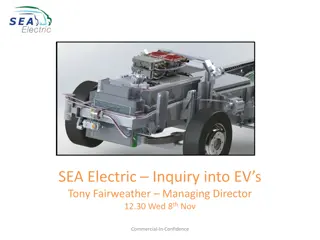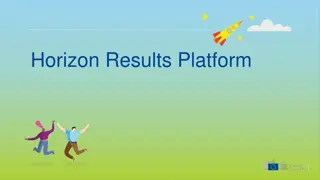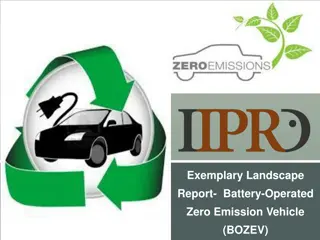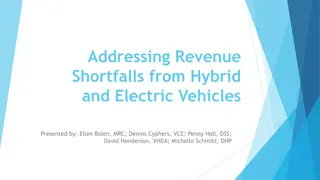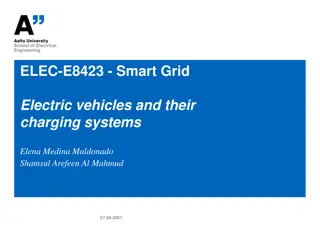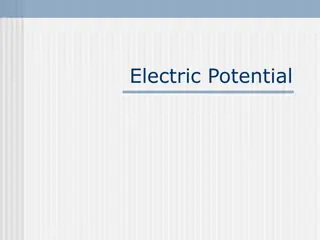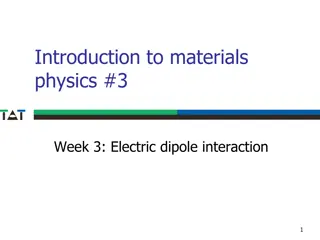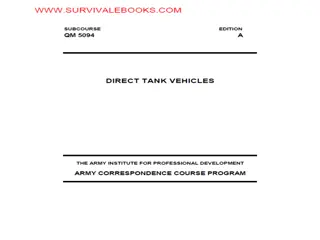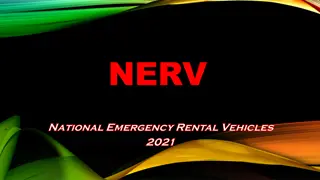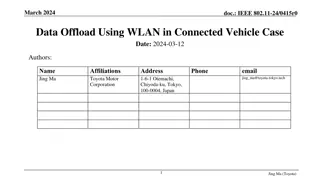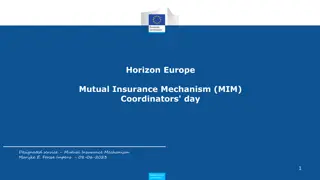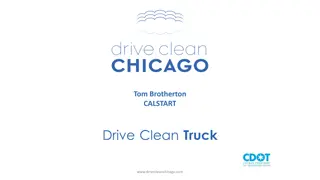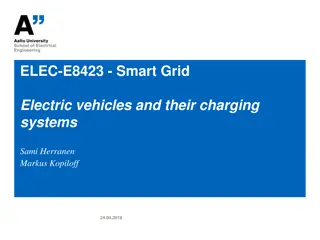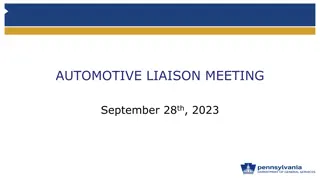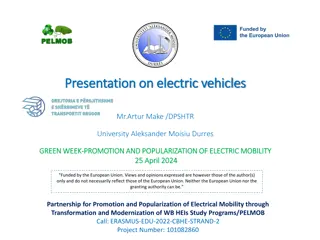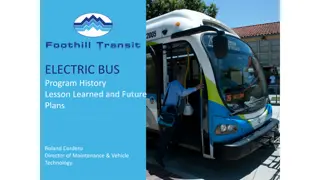Horizon 2020 Objectives for Electric Vehicles R&D Collaboration
Explore Horizon 2020 topics for R&D collaboration in electric vehicles, focusing on low-emission propulsion, sustainable electrification, battery technology, and urban mobility. Learn about funding opportunities and deadlines for innovative projects. Connect with key moderators and support contacts for valuable insights and input.
- Horizon 2020
- Electric Vehicles
- R&D Collaboration
- Low-emission Propulsion
- Sustainable Electrification
Download Presentation

Please find below an Image/Link to download the presentation.
The content on the website is provided AS IS for your information and personal use only. It may not be sold, licensed, or shared on other websites without obtaining consent from the author. Download presentation by click this link. If you encounter any issues during the download, it is possible that the publisher has removed the file from their server.
E N D
Presentation Transcript
Electric Vehicles Moderators: Mark Thompson Frank Winters
Objective and program Objective of this meeting: To plant the seed for future R&D collaboration for electric vehicles. Program: Overview of relevant Horizon2020 topics. Pitches Open discussion
Horizon2020 topics deadline 24 April 2019 Low-emissions propulsion for long-distance trucks and coaches Budget: 25 M , Projects: 20 25 M InCo flagship on Urban mobility and sustainable electrification in large urban areas in developing and emerging economies Budget: 18 M , Projects: 15 18 M
Horizon2020 topics in 2020 Next generation and realisation of battery packs for BEV and HEV 95 Advanced light materials and their production processes for automotive applications Reducing the environmental impact of hybrid light duty vehicles Next generation electrified vehicles for urban use Total budget: 112 M Deadline: t.b.d.
Horizon2020 support and input UK: Louise.Mothersole@innovateuk.gov.uk M: +44 (0)7500952706 NL: frank.winters@rvo.nl / +31 (0)6 15869336 ruben.prins@rvo.nl / +31 (0)6 55346515
Green Vehicles - 2019 LC-GV-04-2019: Low-emissions propulsion for long- distance trucks and coaches - Budget is 25m LC-GV-05-2019: InCo flagship on Urban mobility and sustainable electrification in large urban areas in developing and emerging economies - Budget is 18m LC-GV-03-2019: User centric charging infrastructure Budget is 35m - For all of the above: Submission of full proposal due 24thApril 2019 Innovation Actions (IA)
LC-GV-04-2019: Low-emissions propulsion for long-distance trucks and coaches Long-distance transport is a main consumer of energy and contributor to CO2 emissions in Europe, and requires specific attention due to very high demand on efficiency, dependability, reliability and cost. This topic considers heavy-duty trucks and bus-coaches in long-distance operation, and the challenge will be to reduce their energy consumption, CO2 ,regulated and non-regulated emissions (to anticipate future legislation and emerging issues such as extremely fine nanoparticles) through multi technology vehicles operated on a mix of alternative and renewable fuels as well as recuperated heat and regenerated and externally supplied electricity. Scope:Proposals will have to address all the following technical areas: Sub-systems and component concepts including electro-hybrid drives, optimized ICEs and after-treatment systems for alternative and renewable fuels, electric motors, smart auxiliaries, energy storage and power electronics, suitable for real life operation under different mission conditions Concepts for connected and digitalized fleet management, predictive maintenance and operation in relation to electrification where appropriate to maximise the emissions reduction potential. Implementation of required adaptations in VECTO accordingly to facilitate early take-up of the innovations.
LC-GV-05-2019: InCo flagship on Urban mobility and sustainable electrification in large urban areas in developing and emerging economies Budget is 18m Scope: Actions should bring together European, Asian (e.g. China), CELAC (Community of Latin American and Caribbean States) and African research partners, government agencies and urban authorities, private sector and civil society with relevant expertise and competence within the corresponding cooperation framework and foster participatory engagement in urban electrification in order to reduce air pollution and CO2emissions. All types of vehicle are considered under this topic (powered 2 wheelers, cars, buses, trucks and LDV). Proposals should address all of the following activities: Development of a toolbox for advanced management strategies towards a more efficient private and public electric mobility: E-mobility management strategies, focusing on smart deployment and operation of vehicles, in particular electrified vehicle, to increase mobility and energy efficiency, emission reduction and user acceptance of electrified vehicles - A smart and cooperative management of the vehicle in urban operation, (intermodal route planning, ecorouting eco-driving charging and parking infrastructure availability ). - Deployment and operation of infrastructure use charging infrastructure (conventional and wireless) and network, availability of parking places. Adaptation and integration of existing/ adapted vehicles of different types if necessary. - Efficient integration of the operations of different electrified road public transport, from e-bike to bus rapid transit ( e- BRT) including mini-buses, taxi and mobility services on demand through smart navigation and routing, coordinated traffic management, demand-responsive service and dispatching
LC-GV-03-2019: User centric charging infrastructure Budget is 35m Scope:Proposals will have to address all following technical areas including demonstration of the final solutions and their interoperability in multiple cities and TEN-T transnational road links: Analysis of subjective perception of charging options and identification of decision influences and concerns of users. The results should provide the basis for strategies or solutions to encourage or incentivize users of different social groups to overcome acceptance barriers in order to accelerate widespread usage of EVs. Attractive and convenient charging infrastructure access with connected vehicle systems avoiding waiting times (through for instance, charging facility reservation and scheduling, integration with route planning of multiple vehicles). User preferences like use of renewable energy and avoidance of frequent handling of heavy cables have to be considered. Automated conductive or wireless solutions are expected with highly reliable and interoperable devices. Test methods need to be further optimized, for instance to assess interoperability. Optionally, further extension of the developed stationary wireless charging technology towards urban and periurban "electric road" applications, with the aim of creating an installed base of wireless-ready vehicles to provide the critical mass needed for the deployment of electrified roads at a later stage. Transparent, flexible and interconnected payment systems for maximum availability of the charging infrastructure also for drivers who do not regularly use the same car (company/family sharing, commercial car sharing, rental cars, ) or travel across Europe. User survey about parking habits, considering for instance how much time is spent at a given location; what type of services are needed or expected during charging; how should the future charging station look like. Improvement of the currently deployed or planned superfast charging systems according to the previous survey to convince all car owners of the advantages of electric mobility including a sufficient convenience for long trips. All technical possibilities for optimization, both on the vehicle (like temperature preconditioning), or for energy demand rationalisation (e.g. local renewable power support for solar panels, battery storage for peak shaving and other grid services, demand control by interconnected route management systems for incoming vehicles while taking into account the electricity grid availability and voltage and frequency control constraints in real-time) need to be taken into account. Scalable charging infrastructure for ramp-up of expected electric mobility needs in terms of power levels and number of charging posts at one site, adequately managing the impact on the grid. Cheap low power DC-Charging for highly efficient connection to future home and office energy systems based on DC-Networks with possibility of V2G by smartening the link between vehicle, charging infrastructure and the grid. Low power DC-charging for LEV s in combination with theft-proof parking for two-wheelers. Analysis of market models, regulatory and harmonization recommendations to foster the deployment of EV charging infrastructure in all member states of the EU. Demand control also for slow charging in public or private parking garages shall be enabled by standardized communication to remove barriers of electricity installations in existing apartment blocks and garages considering smart grid implications. Development of planning methods to optimize the location of charging sites, taking in consideration user needs and habits (volume of EVs in the area, type of mobility needs, accessibility to charging points, traffic volume, ) as well as time and costs associated to the availability and reinforcement of the necessary electricity network with easy scalability according to the different stages of EV penetration. Analysis and cost effective solutions for specific cases like availability of infrastructure in isolated mountain or seaside locations, or for special events, where high peak demand is associated with short periods of use. Consideration for local storage benefits in the different cases studied.
Possible Topics for 2020 Automated Road Transport Large-scale, cross-border demonstration of highly automated driving functions for passenger cars Digitising and Transforming European Industry and Services: Automated Road Transport Green Vehicles Next generation and realisation of battery packs for BEV and HEV Advanced light materials and their production processes for automotive applications Reducing the environmental impact of hybrid light duty vehicles Next generation electrified vehicles for urban use
Topics for 2020 Not yet fully defined We have an opportunity to influence Suggestions on a postcard Influencing organisations to consider engaging/joining: - ERTRAC ERTRAC is the European Road Transport Research Advisory Council. It is the European technology platform which brings together road transport stakeholders to develop a common vision for road transport research in Europe - EGVI The European Green Vehicles Initiative is a contractual public-private partnership dedicated to delivering green vehicles and mobility system solutions which match the major societal, environmental and economic challenges ahead. - EARPA EARPA is the association of automotive R&D organisations. It brings together the most prominent independent R&D providers in the automotive sector throughout Europe
Horizon2020 support and input UK: Louise.Mothersole@innovateuk.gov.uk M: +44 (0)7500952706 NL: frank.winters@rvo.nl / +31 (0)6 15869336 ruben.prins@rvo.nl / +31 (0)6 55346515


